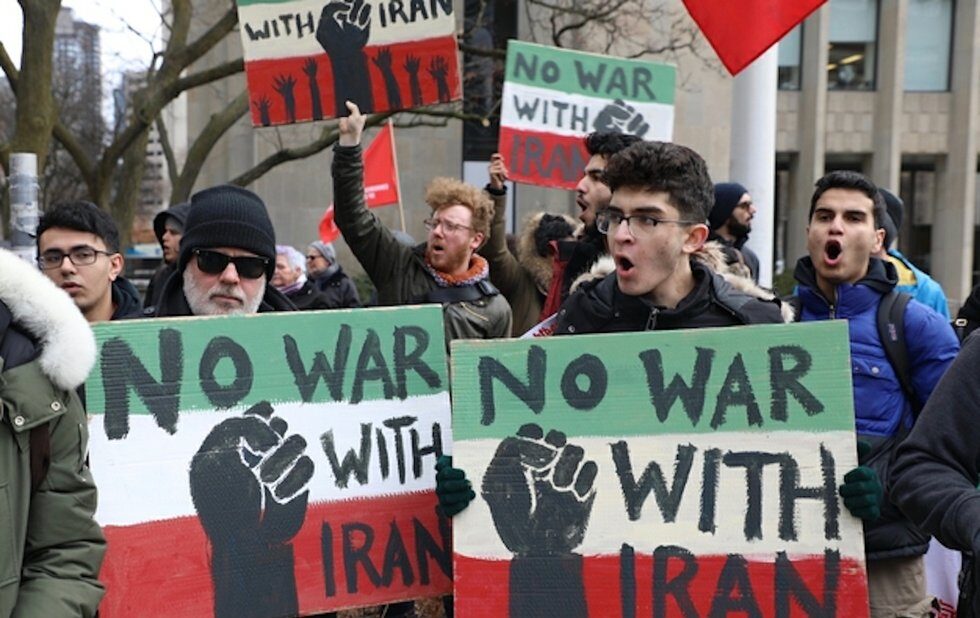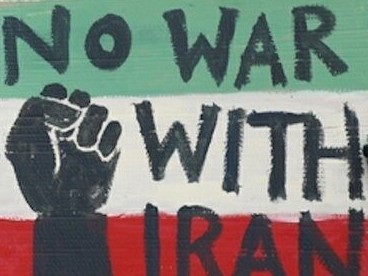
Photo credit: Zach Ruiter
Why We Struggle: The US obsession with the Islamic Republic and the Demise of Pax Americana
by SINA RAHMANI
The Islamic Republic of Iran has occupied a rarefied position in the American political imagination for more than four decades. The mid-sized West Asian country has played the role of chief boogeyman of US foreign policy debates. Despite its relatively tiny defense budget Iran somehow looms over every military conflict in the region: Lebanon, Iraq, Yemen, and Palestine. The country is a seemingly permanent cast member in the at-once extremely sophisticated and incredibly stupid soap opera of global Anglophone news. Not an hour goes by without the publication of a sensational story about Iran and/or the machinations of “the regime” of “mullahs” that has supposedly governed it monolithically since the 1979 revolution.
Iran is not just an object of great fascination for the Anglophone media. As large media institutions of far greater note cut staff in the last decade, plenty of venues recruited Persian-speaking talent. In addition to BBC Persian, which launched in 2009, Persian-language satellite viewers and online readers have seen their options multiply: Manoto, Iran International, IranWire, and the Independent in Persian to name a few of the newly-established, well-heeled outlets—all of them funded by actors and institutions openly hostile to the Islamic Republic.
Meanwhile, an ever-burgeoning group of specialists and “Iran Watchers” have blossomed in universities, think tanks, and other advocacy groups—many with direct lines to the halls of power. While the quality of the analysis varies wildly between the individual personalities and the private corporations that employ them—sometimes with comical results among the bottom-dwelling think tankers[1]—the collective institutional force they comprise as a class undeniably works towards the same goal: “regime change.”
A prominent misconception is that regime change is a specific political position or policy. It is not. Regime change is a logic that has evolved over the course of decades. It encompasses not just Iran but a slew of states, ones that do not welcome US imperialist dominance and are therefore classified as “rogue.”
The Empire’s Burden: Policing “Rogue” States
A brief refresher on recent world history is necessary: the US has reigned as the undisputed global hegemon for several decades. It has not maintained this level of dominance by living peaceably with those who question its decisions and priorities. When anyone attempts to leave the fold, Uncle Sam, like an actual James Bond villain, has many ways to entice them back. If the individual bad actors in any given country can be liquidated or bought off, that can be arranged easily.[2] This usually takes place quietly, far from the prying eyes of the public, and we learn about them as an afterthought decades later in some obscure academic monograph. Life goes on, as does the news cycle.
This system is not ironclad. Every now and then, something slips through the cracks. Evade the eagle’s talons long enough and you receive a mandatory induction into an elite club of “rogue” nations: Cuba, the DPRK, Syria, Nicaragua, and Venezuela[3]. Rogue states have successfully fortified themselves against the largest and most advanced conventional force in the world, the product of a military buildup that has lasted for three quarters of a century.
Despite all the exceptionalist bluster, the US empire shares the same exact existential angst as its European forbearers; any strong, independent collective that proves it can defend itself against foreign invaders is truly terrifying. Understanding why Iran and other rogue states are on the receiving end of such intense media vitriol —in different ways and to varying degrees depending on the circumstances—is not particularly difficult. Phrased simply: any refusal to submit to the insatiable greed of multinational corporations and the politicians who represent their interests will not be tolerated. The rogue nations you hear about constantly from our billionaire-owned corporate media are threatening precisely because they are not weak and passive.
The elephant in the room: what was the point of all those countless trillions—the NYPD annual budget is roughly five times the size of the entire military expenditure of the DPRK—when you can’t even impose your will on a few renegade states scattered across the globe without risking a massive retaliation? This question does not receive much serious scrutiny in the mass media, far more interested in speculating about the imminent death of Kim Jong Un.
Military Stalemate, Hard vs. Soft Regime Change and the Rise of Hybrid War
The halcyon days when the US could effectively enact “hard” regime change fairly easily (Panama, Grenada) are long gone. The US managed to bulldoze its way into Afghanistan in 2001 and Iraq two years later, but these costly, protracted endeavours cemented US public opinion against any similar initiatives in the future. The specter of tens of thousands dead in the first hours of a conflict with Iran would sober even the most rabid hawk.[4]
If Iraq was the laboratory for hard regime change, today the Islamic Republic acts as an experimental playground for soft regime change and what has been termed “hybrid warfare.” This strategy, which has been openly embraced by US officials and policymakers across the political spectrum for more than a decade, essentially leverages all the remaining forms of US power over the country. An updated and brutal form of siege warfare, the US has effectively weaponized its soft power over global financial and cultural systems to undermine Iran’s economy. Add to the mix the fact that US intelligence agencies and their regional partners can help sow chaos into the country through occasional acts of sabotage—like Stuxnet, which heralded the beginning of the new era of digital warfare between state actors.
These sanctions do more than choke off the country’s economic and state institutions—they effectively criminalize the very state itself. The US did this in the lead up to the assassination of Qassem Soleimani when they designated one of the military institutions of the Iranian state as a terrorist organization.
More insidiously, though, this is where the veritable army of mostly native media informants, academics, and “Iran watchers” based outside the country come back into the picture. Their task is two-fold. On the one hand, they spotlight anything and everything that reflects negatively on the Islamic Republic as symptomatic of a failed state: floods, industrial accidents, domestic violence, corruption, etc.
On the other hand, and more importantly, they are the primary conduit for transmitting even the slightest form of political dissent against the Iranian state to the outside world. As is standing operating procedure (Syria, Ukraine, and most recently, Hong Kong), they legitimate any and all resistance to governments hostile to US imperialism as “pro-democracy” or “moderate rebels.” This in turn creates an ideological feedback loop that retrenches the view that the Islamic Republic is an unjust “regime” teetering on collapse. According to them, the current regime, which overthrew the US-allied monarchy in Iran will imminently fall. It is only a matter of time, and with the help of economic sanctions and some covert action, the operation can be completed “peacefully”. Peaceful, of course, is a relative term that applies to US military lives and assets, not Iranian lives.
Why We Struggle Against Imperialist Aggression Targeting the Islamic Republic of Iran
The Iranian people have been the target of colonization and imperialist violence for well over a century. They have the right to live in sovereignty and free of external dictates. Only the people of Iran have the right to choose their leaders and political system and no other country has a right to impose its will on the people. If the Iranian people choose a democratic, socialist or a religious state, only they have the right to change that choice.
Democracy was never delivered on the backs of imperialist tanks. Only misery, suffering, starvation and insecurity could be delivered by tanks. Iran represents no threat to US borders and the US has no right to determine the systems of governance or resource control for other nations, especially those who had endured the violence and underdevelopment of colonialism.
We struggle against imperialism to bring about a system of justice, equity and self-determination. The loss of sovereignty through direct occupation or through puppet regimes can never bring about peace and development. These forms of imperialist dominance are exemplified in Iraq and Libya as occupation and direct invasion, respectively, and in Egypt and Bolivia as repressive and anti-democratic puppet governments. US history is filled with examples of both, from the bloody invasion of the Philippines to the military Juntas of El Salvador, Guatemala, Chile, and Cuba’s Samoza.
Iran is a sovereign and, unlike the US, is not a global empire hellbent on monetizing every square inch of the planet. That the country is so intensely villainized in all domains of US public life is proof enough to any fair observer that Iran deserves your solidarity. Iranians deserves better than the harsh sanctions forced on them daily. This kind of modern siege warfare—crafted by Ivy-leaguers in suits and enacted by careerist politicians—are aimed at Iran’s sovereignty. Four decades of steadfast resistance to a neverending storm of US pressure should make one thing clear: Iranian people are capable of determining their own fate. Stand with them.
[1] One recent study has exposed the incompetence with which the sausage gets made: “[a]round half of the Iran experts based at think tanks in DC could not read, write, or speak Persian… And a similar number had never once stepped foot inside Iran. One research assistant working at a prominent think tank told me how, as someone who reads Arabic, he would read Persian language news articles aloud for another research assistant who could only speak (but not read) Persian. The two of them together would “translate” Iranian news articles for his boss, an expert who works on the Middle East and comments on Iran frequently.” https://www.jadaliyya.com/Details/39946
[2] “We will coup whoever we want,” Elon Musk proudly announced in a since-deleted tweet in regards to illegal ouster of Bolivian President Evo Morales.
[3] Rogueness is a special category applied to certain geopolitical rivals. Russia and China, for example, probably pose the greatest military threats but for whatever reasons do retain their unique villainy
[4] “Millennium Challenge: The Real Story of a Corrupted Military Exercise and its Legacy” https://warontherocks.com/2015/11/millennium-challenge-the-real-story-of-a-corrupted-military-exercise-and-its-legacy/
Sina Rahmani is the creator of “The East is a Podcast”. He completed his Ph.D. in Comparative Literature at UCLA. He is a translator, scholar, and writer. His work has been published in the PMLA, Iranian Studies, boundary 2, Radical History Review, and Public Books.
